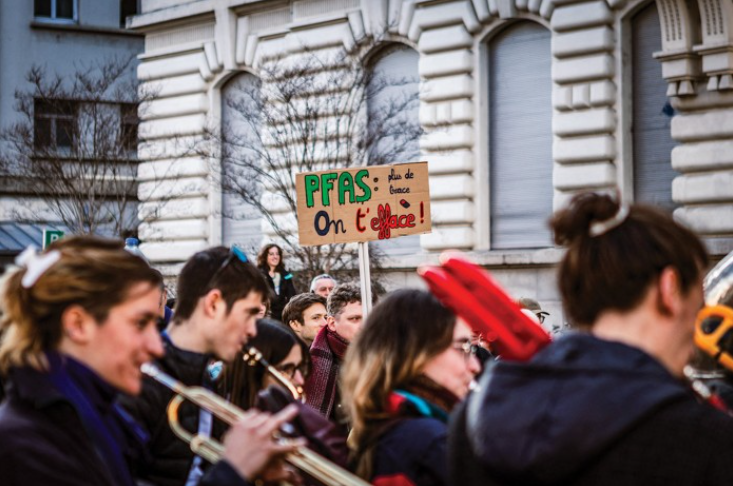CHAGO ENGINEERING NEWS ARTICLE REVIEW_France to introduce PFAS ban on consumer products
hello
We are Chago Engineering, striving for the best engineering.
Today we're going to take a look at national and international news and discuss articles.
Today's article is from C&EN overseas
France to introduce PFAS ban on consumer products
이미지 출처: Elsa Biyick/Hans Lucas/AFP via Getty Images.
French lawmakers have passed a bill to ban per- and polyfluoroalkyl substances (PFAS) in certain consumer uses, making France the second European country to crack down on the persistent pollutants ahead of potential European Union–wide action.
The French National Assembly, the Parliament’s lower house, adopted the legislation, put forward by the party the Greens, on Feb. 20, voting 231–51 in favor. The bill now has to go through final procedural steps, including a constitutional review, before President Emmanuel Macron can sign it into law.
A ban on the manufacture, import, export, and marketing of cosmetics, footwear, consumer textiles, and ski wax containing PFAS would enter into effect in 2026. From 2030, it would ban all textiles containing the substances, except for protective clothing for safety and civil security professionals.
The bill also adds PFAS to the list of substances monitored in drinking water in France and imposes on companies a fee of €100 ($104) per 100 kg of PFAS emitted into the environment.
A ban on PFAS-containing cookware was originally included in the draft law but removed from the final text. Industry representatives lobbied heavily against the inclusion; Groupe SEB, which manufactures Tefal frying pans, rallied its employees to protest against the bill near the French Parliament last spring.
The French measure is smaller in scope than the highly anticipated EU-wide PFAS restriction, which would cover both consumer and industrial applications, including cookware. Rules imposed by the European Commission would essentially override the French law, but they are still a long time coming: the restriction proposal has been trudging through the EU legislative process since 2023 and is not set to be in place until 2030.
France is the second EU country to take matters into its own hands with PFAS. In 2020, Denmark banned PFAS in paper and cardboard food packaging, and from July 2026, it will also ban the sale and import of consumer clothing, footwear, and waterproofing products containing PFAS.
Public health and environment groups applaud the decision. “Now France needs to get firmly behind an EU-wide restriction on PFAS ensuring more products are included and citizens of all member states are protected,” Sandra Bell of the nongovernmental organization Chem Trust says in a statement.
Environmental law group ClientEarth says in a statement that the bill has “undeniable shortcomings” in the exclusion of industrial uses and cookware. “Alternatives to PFAS in cookware exist; they are already being sold and work perfectly well. That’s why we hope cookware is included in the proposed EU ban,” the NGO’s legal expert Hélène Duguy tells C&EN.
“Nonetheless, France is one of the first countries to act on what is both a public health and an environmental crisis, and it should be applauded,” she says.
And in a statement, Cassie Barker, senior program manager for toxics at the Canadian advocacy group Environmental Defence, calls on Canada to “follow suit not only to better protect us from PFAS-related harms and diseases, but also to lower trade barriers with the EU.”
French utility giant Veolia says in a post on LinkedIn the bill “encourages us, collectively, manufacturers and environmental actors, to rethink our processes and to act even more upstream to prevent pollution.”
“The message is clear: less pollution to treat means more purity for our resources,” the company says.
C&EN reached out to several other industry professionals for comment but did not receive any responses by press time.
Article content summary
France has become the second EU country to pass legislation banning PFASs.
Starting in 2026, the manufacture, export, and sale of cosmetics, shoes, textiles, and ski wax containing PFAS will be banned.
Companies will also be required to increase monitoring to check for PFAS in drinking water and will be charged a fee of 100 euros ($150,000) for every 100 kilograms of PFAS emitted.
While environmental organizations expressed disappointment that cooking utensils containing PFAS were not added to the ban, they said they support France for acting on the environmental crisis.
What today's article means to you
Today's article sheds light on why it's important to replace PFAS coolants, which are commonly used in semiconductor testing, with more environmentally friendly coolants. PFAS are a class of toxic substances called perfluorinated compounds that have been called “chemicals that never go away” and persist in the environment and human bodies, causing environmental pollution and cancer. As the dangers of PFAS are becoming known overseas, lawsuits against PFAS-producing companies and laws banning PFAS are being introduced, there is a growing need to introduce non-PFAS eco-friendly coolants to respond to PFAS regulations in Korea.
Amidst this social movement, Garage Engineering is planning to develop and launch a non-PFAS semiconductor coolant. Since it is domestically developed and produced, it is cheaper than imported coolants and is certified by the Material Safety Data Sheet (MSDS) and the National Sanitary Safety Organization (NSF), so we are doing our best to release a stable eco-friendly coolant, so we look forward to your expectations and interest.
What did you think of today's articles?
We'd love to share any other great articles you find.
Thank you







